Six trends to predict the housing market

Six trends to predict the housing market
Here are six things we can keep on eye on to try and determine which direction the housing market could be heading.
1. The news – News companies thrive on trying to predict the future and while they sometimes over state things, oftentimes it can be a good indicator of what is to come. If buyers are overly fearful of what the news is saying, it can cause them to wait it out and see what happens.
Google “Canadian Real Estate market crash” and you’ll see headlines like
The news is certainly indicating that a correction is on the horizon, but doesn’t that sound familiar?
2. Employment Rates – Low unemployment levels typically point towards an increase in prices as more people look to purchase and high rates would decrease as people cannot afford to buy. Canada’s unemployment rate has been trending down for the last 6 months, but It is higher than pre pandemic years. Will Vaccine Mandates affect this?
3. Months Of Inventory – This market stat is one of the best indicators of where the market is going. Month of inventory means this: If no new listings came on the market, how long would it take for everything currently for sale to sell. Currently in Grey Bruce it is 1.8 months and in Canada it is 2.1. We remain in a tight sellers market.
Sellers Market <4 months
Balanced Market 4-6 months
Buyers Market >6 months
4. Affordability – This includes the cost of the home, cost to maintain the home, and the level of income to support the home. If income rises with home prices, then things will not change, however if income stays equal and home prices go up then we have a problem. Low interest rates have been key to keeping homes affordable. An increase in interest rates combined with an increase in gas, electricity, property tax would take a toll on housing prices.
5. Showing Request – Showing request on listings tracked over time can indicate buyer confidence in the market. In Ontario showing requests have been trending down since May, but look to be starting on an upward trend, more data is needed.
https://www.showingtime.com/impact-of-coronavirus/
How are builders feeling about the market? An increase in housing starts indicates confidence, lower starts indicate skepticism. Since the pandemic began Canada has been trending upwards in housing starts, peaking in March. Since then it has been trending down, however we are still significantly higher then pre pandemic.
How about Lumber? We all know how bad that got during the winter, it has fallen, taken a sharp turn and fallen back down.
So what can we conclude with all this information? Right now the news is predicting a crash, and affordability is dwindling with the cost of housing and living going up. However, inventory remains low, unemployment is low, and builders are still building. I believe we are in an unknown territory.
Want to talk Real Estate? Connect with me here, I’d love to chat.
Source: https://www.revrealestateschool.com/tips/how-to-predict-real-estate-prices
Do you have to pay tax on vacant land sales in Ontario?
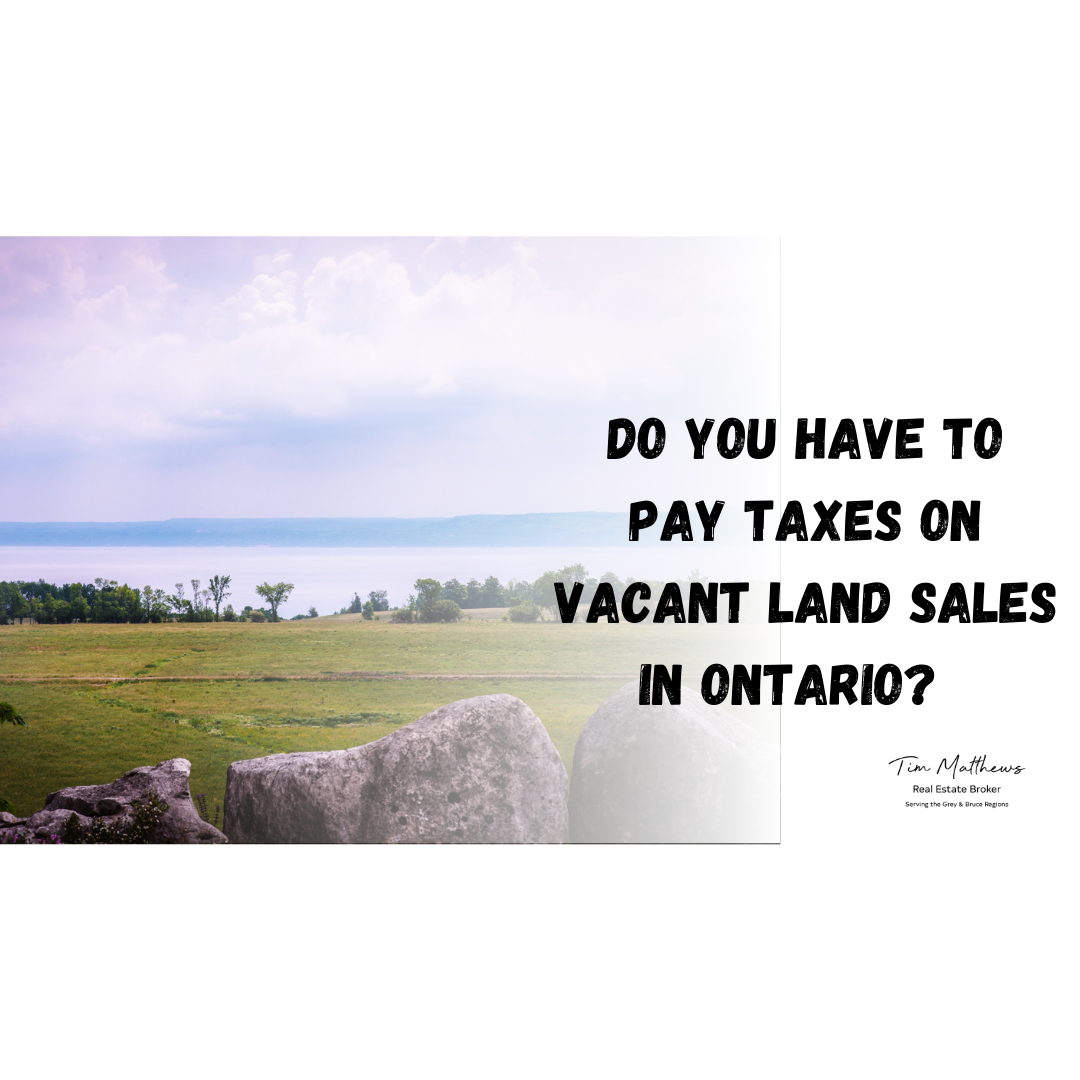
Do you have to pay tax on vacant land sales in Ontario?
To answer this question it has to be broken down into two categories, Capital gains tax and HST. In general you do have to pay a capital gains tax, however HST is not often applicable. Watch the video below as local accountant Adam Vander Duim explains the answer to this question.
According to the Gov of Canada there are 3 scenarios where your vacant land sale would be subject to HST:
- capital property that you have used primarily for a business
- the sale of land through the course of a business
- selling land after the original parcel has been subdivided 2 or more times.
For more information on tax of vacant land sales check out the Government of Canada’s website.
Need to connect with an accountant? you can contact Adam here.
Want to talk Real Estate? Connect with me here, I’d love to chat.
What does blind bidding mean?
What does blind bidding mean?
The Federal Liberal Government recently announced its plan to put forth a buyer’s bill of rights that would ban the practice of blind bidding in real estate. On the Surface eliminating blind bidding would probably seem like a good thing but would it really be? In this blog I’ll explain what blind bidding is, and the pros and cons for each side.
In Ontario sellers can opt to sell their home however they choose, through blind or open bidding, with the majority of sellers choosing to sell with the blind bidding method. With the blind bidding process nobody is allowed to know anything about the other parties’ offer, this includes price, terms and conditions. The only thing that a buyer can know is the amount of offers they are competing against. So buyers will put out their best bid on a home and hope that it is higher than the other offers. A buyer could pay 200k more than the next best offer and they would never know it; so the reason why there is much talk of banning the practice is to avoid buyers from drastically overpaying for a home which in turn should cool off home prices.
Is this really a good idea?
Privacy concerns – from a strategic standpoint the price is not always everything that will win an offer. There are so many other factors that can affect what offer a seller will choose; conditions, deposit, closing date. There are a lot of grey areas here. Does the seller have to pick the highest price or will they be able to choose whatever offer they want? What about an offer that has a condition upon selling their home and wants to pay more?
Seller rights – We live in a free country and sellers should not be told how they can and cannot sell their homes. What is being proposed is to amend the criminal code so that you must sell through an open bid strategy.
Will it actually help cool prices? Most advocates for this think that opening it up would create an even playing field, however could it do the opposite? In parts of the world where they do open auctions it often creates a frenzic chaotic environment that is easy to overspend in. Australia uses an open bidding process and often holds auctions on the front lawn of the home. Australia is currently in the middle of a huge housing price boom and also sees homes go over the asking price. It’s arguable that a blind bidding system allows buyers a calm environment to determine what they are willing to pay for the home.
Finally, not every home gets multiple offers, in fact prior to COVID hitting the majority of homes outside the GTA did not get multiple offers. We have a housing supply problem in Canada that has been accelerated during COVID. The only 2 things that are going to slow prices down are building more supply and raising interest rates. In my opinion opening up the offer prices is not in the best interest of the buyer or the seller.
For more info check out my video below:
Mortgage Questions & Answers
As a first-time homebuyer or even if you are looking for your next home, you may have a lot of questions about the buying process. Here are some common questions about mortgages.
Should I rent an apartment or buy a house?
It depends on both lifestyle and financial factors. Do you have a nomadic lifestyle, or are you ready to settle down in one place? Do you like living close to other people or having your own detached home? Do you want to save money and build wealth by owning a piece of real estate?
Renting an apartment can make sense for people who move often and are too busy to take care of a house. When you rent, your monthly expenses are very predictable, and someone else is responsible for handling repairs. Over the long term, you might be able to save money and invest it in other ways than owning real estate.
Owning a home can make sense for people who want to settle in a certain city, town, or neighbourhood and put down roots. Homeownership brings intangible benefits like the feeling of belonging to a community and the pride of ownership. You can make changes to your home, and there is the possibility of building equity (depending on changes in the real estate market).

How does a bank decide how much of a mortgage I can get pre-approved for?
Mortgage professionals use two ratios to determine if borrowers can afford to buy a home. The ratios are called Gross Debt Service (GDS) and Total Debt Service (TDS). Each financial institution has its own GDS and TDS maximums. GDS is the percentage of your monthly household income that covers your housing costs. TDS is the percentage of your monthly household income that covers your housing costs plus any other debt payments you have (i.e., line of credit, car loan, student loans, etc.).
What information or documentation will I need for a pre-approval?
- Personal information: date of birth, social insurance number
- Residence information: renting or owning, monthly payments
- Employment information: employer name, job title, and income, job letter, pay stubs, last one or two years Notice of Assessment income tax forms
- Assets: RRSPs, vehicles, TFSAs, shares, stocks
- Down payment amount
Depending on your employment situation, your lender may want to see more documentation.
You will also need to show where your down payment money is coming from. In most cases, you simply need to show your bank account activity over the past three months. If your down payment is in the form of a gift, you’ll need to show a gift letter and that the corresponding amount has been deposited into your account. Lenders also like to see you have the money in place for closing costs.
What is a mortgage stress test?
Potential homebuyers need to pass a mortgage stress test. The test is a way of seeing how you would cope with your mortgage payments in the event that interest rates rise or you lose your job, etc. All potential homeowners need to prove they can afford their mortgages based on their lender’s minimum “qualifying rate.”
As of June 1, 2021, you’ll need to qualify at your contracted mortgage interest rate plus 2%, or 5.25%, whichever is higher. For example, if you apply for a mortgage at 3.65%, your lender will assess you as if you were paying at 5.65% (3.65% + 2%), since 5.65% is greater than the benchmark rate of 5.25%.
What is the minimum credit score required for a mortgage?
In 2021, you’ll need a credit score anywhere between 620 and 680, depending on the lender. However, the minimum credit score also depends on several other factors. For example, a borrower with a high income and low debt amount may qualify for a mortgage with a slightly lower credit score than a borrower with a lower income and lots of debt.

How does your credit score affect your mortgage?
A high credit score will help you get a favourable interest rate from a conventional lender like a bank. Credit unions, trust companies, and subprime lenders provide mortgages to people with lower credit scores, and you will likely pay a higher interest rate.
Your best strategy is to take the time to improve your credit score before applying for a mortgage. You’ll have an easier time getting approved for a home loan and qualify for a lower rate, which will make your mortgage less expensive.
What are the different types of mortgages?
A conventional mortgage is a loan for up to 80% of the purchase price or appraised value of a property. The remaining amount required for a purchase (20% or more) is paid by you as a down payment.
If you need to borrow more than 80% of the purchase price, you’ll need to apply for a high-ratio mortgage. High-ratio mortgages must be insured with mortgage default insurance.
The qualifying rules for mortgages now require a stress test. For high-ratio mortgages, applicants need to qualify at the current Bank of Canada benchmark rate. For conventional mortgages, you need to qualify at the higher of either the 5-year benchmark rate or the original contract rate plus two percentage points.
What is mortgage default insurance?
It’s a type of insurance policy that protects lenders from borrowers defaulting on their mortgages. Canadian buyers who have down payments that are less than 20% of the purchase price are required to have mortgage default insurance.
This insurance is provided by three providers: Canada Mortgage and Housing Corporation (CMHC), Canada Guaranty, and Genworth Financial. The insurance is an extra monthly amount attached to your mortgage payments.
Does it make sense to take mortgage default insurance for a cheaper interest rate?
Sometimes. For example, if you have 35% equity and the difference between insured and insurable mortgage rates is 15 basis points or more, you will save money by paying a default insurance premium. If your home purchase is under $1 million, you can qualify for cheaper insured mortgage rates.
When your mortgage comes up for renewal, you can carry that insurance over to your next mortgage term—even to a new lender, if you haven’t refinanced after getting the mortgage.
Some lenders have a disproportionately bigger appetite for insured mortgages and may price them more aggressively. Maintaining active insurance is beneficial because it lets you keep qualifying for the lowest mortgage rates on the market, which are usually high-ratio insured rates.

Is a low-interest rate for a high-ratio mortgage better than a higher conventional rate?
While it’s true that you could save a couple of thousand dollars in a high-ratio five-year fixed rate, the added cost of default insurance offsets that savings by a considerable margin. Conventional borrowers still experience lower all-in borrowing costs.
What are the different types of mortgage interest rates?
-
- Fixed rate: The interest rate and payments stay the same for the entire term.
- Variable rate: The interest rate will increase and decrease, but you can keep your payments the same for the entire term. This is called a fixed payment with a variable interest rate. You also have the option of an adjustable payment with a variable rate. Variable interest rates are usually lower than a fixed interest rate.
- Hybrid or combination interest rate: Part of your mortgage has a fixed interest rate, and the rest has a variable interest rate. The fixed portion gives you some protection in case interest rates go up, while the variable portion is beneficial if rates fall. Each portion may have different terms, which means these kinds of mortgages may be harder to transfer to another lender.
How much interest will I pay over a 5-year term?
Use this mortgage payment calculator from Canada Guaranty to see what payments you would make in three different scenarios.
What does mortgage amortization mean?
An amortization period is the length of time it will take you to pay off a mortgage. It is an estimate based on the interest rate for your current mortgage term.
If your down payment is less than 20% of the purchase price, the longest amortization you’re allowed is 25 years.
Is the Real Estate Market cooling in Grey Bruce Owen Sound?

Is the Real Estate Market cooling in Grey Bruce Owen Sound?
By Tim Matthews, Broker with Century 21 In Studio Realty.
Is the market starting to slow down again in Grey Bruce Owen Sound (GBOS)? The stats would say yes, but it’s hard to say if this is just a seasonal/cyclical summer slow down that will once again pick up in the fall. Let’s look at some stats.
Why Month of Inventory is the Best Stat to look at
My favourite stat to look at is Month of Inventory (MOI), what does this mean you ask? Well, how long would it take for everything to sell if no new listings came on the market. Back in January the GBOS real estate market hit an all time low of one month of inventory with a total of 254 homes for sale. For the month of July we are now at 1.9 months of inventory with a total of 505 homes for sale. To put this into perspective, let’s compare it with July of 2014. We were sitting at 15 months of inventory with 2540 active listings. That is a strong buyers market. Since 2014 the supply of homes has been trending down, and once COVID hit we saw massive price acceleration. We are still in a strong sellers market based on Month of Inventory of 1.9.
Check out this graph showing month of inventory in Grey Bruce Owen Sound since 2009.
What about prices & sale volume in the month of July?
The median sale price in GBOS in July was $535,000, up 26.6% year over year. However if you look back at the month of June the median sale price was $558,000 so prices have dipped slightly. What about Volume of sales? This area really cooled off. In the month of June BGOS saw 340 home sales. That was down to 260 in July. The graphs below show volume of sales and sale prices.
It’s a good time to sell and buy right now
It’s obvious the market has cooled, but it certainly has not crashed. Prices are still high and inventory is low. Anyone looking for a substantial market crash will likely be left waiting for a long time. If you’re considering a sale, prices are still up 26.6 % since last year, and homes still got 100% of their asking price in July. If you’re thinking about buying, August brings a great opportunity: Lower sale prices, motivated sellers & less buyer competition.
Tim Matthews is a Real Estate Broker with Century 21 serving the Grey & Bruce Owen Sound area. Want to connect with Tim about buying or selling a property? You can contact him here.
Or you can call or text Tim any time at 519.375.7153
Wartime Housing in Canada and Ontario
Wartime houses are a Canadian legacy from the 20th century. The importance of these modest houses was acknowledged by Canada Post in 1998 with the “Veteran’s House” stamp.
This blog post will give some background about the history and architecture of wartime housing.
When were they built?
Between 1941 and 1947, a federal crown corporation called Wartime Housing Limited built 46,000 wartime homes across Canada. They were first built as rental units, but by 1944 the government had started to encourage homeownership.
Most of the houses were prefabricated and then shipped to the building sites. This resulted in very homogenous developments in almost every major Canadian city.
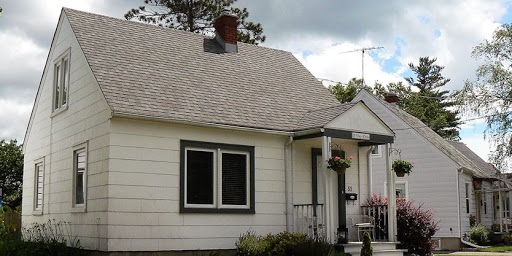
What do they look like?
The architectural style of these wartime houses has been referred to by a number of names: “Simplified Cape Cod” (because they are a compact version of New England styles), “Strawberry Box” (because they resembled a common fruit container), and “Victory Houses” (celebrating the Allied victory in the Second World War).
These houses were small and built from federal government-provided floor plans. The typical styles of the wartime house were detached bungalow, one-and-a-half storey, and two-storey semi-detached structures.
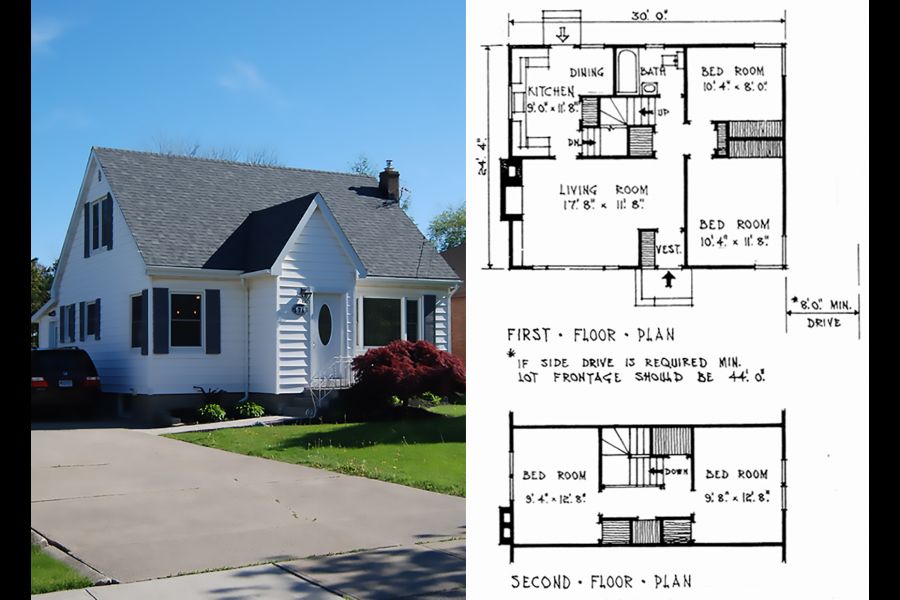
The facades were clapboard siding painted white (or brick) with entrances at the front and the side. They had steeply-pitched gable roofs, small sash windows, and small metal chimney stacks.
Inside the houses, the main floor often had a living room, kitchen with dining area, bathroom, and one bedroom. The upstairs had two more bedrooms.
The streets around wartime houses were often curved or featured cul-de-sacs and given war-specific names such as Victory or Churchill. A large park was often planned for the centre of the neighbourhood.
Why were they built?
The government of Canada was hoping to avoid the disaster of the 1919 Soldier Settlement Act that failed to meet the needs of returning soldiers.
In 1942, the government passed the Veterans’ Land Act to build wartime homes to help returning veterans and their families, as well as people working in war-related industries. The act included measures to build or finance housing, and one of the main objectives was to get people working, specifically by giving them a bit of land in order to provide for themselves. The houses were very small to allow for a large portion of the property to remain available for gardening.
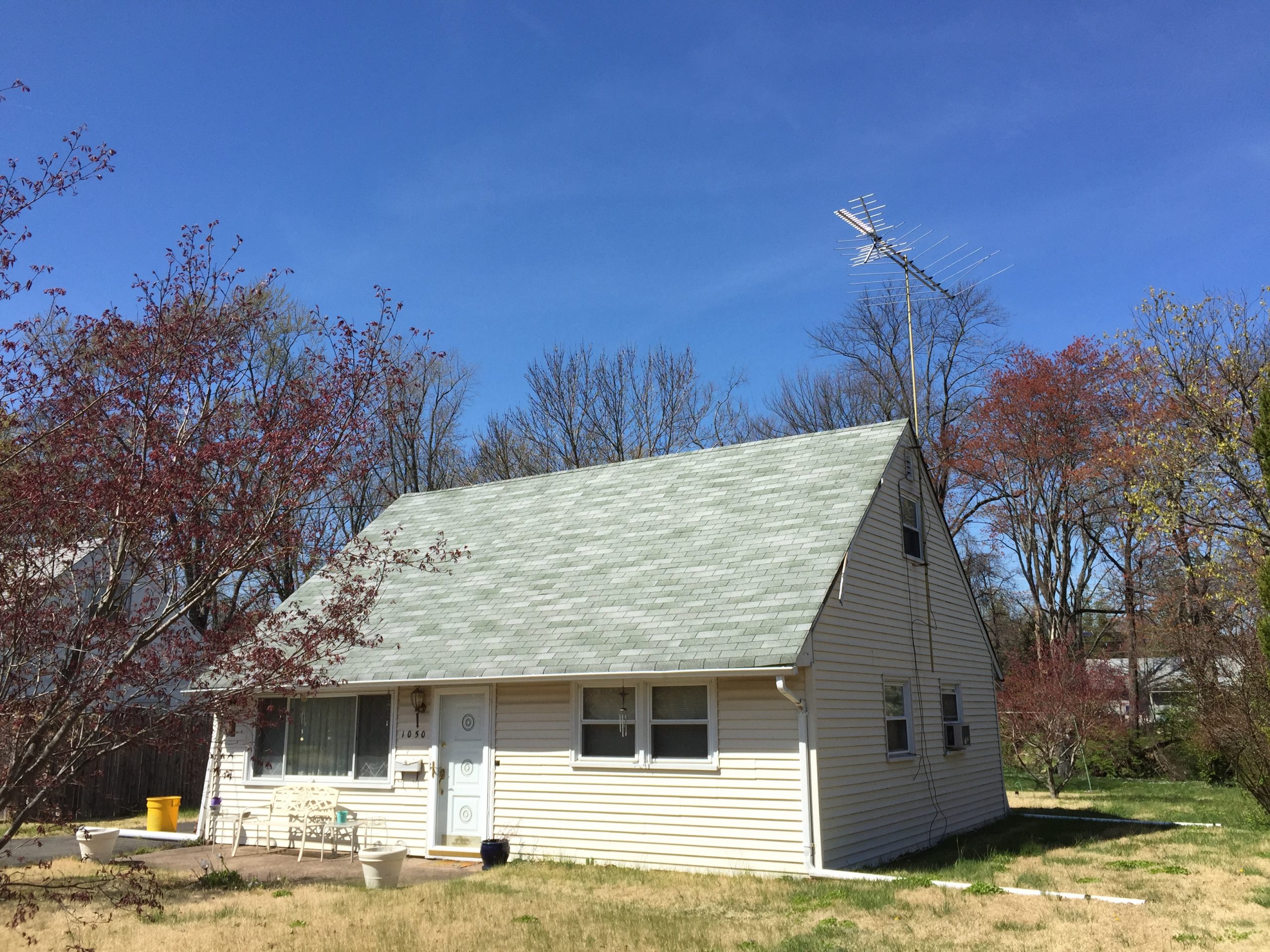
One unusual example of wartime homes for people working in war-related industries is in the Scarborough neighbourhood of Toronto. Dormitories were built in 1941 for the employees (mainly women) doing munitions work at the General Engineering Company near Warden Avenue and Eglinton Avenue East.
What is the cost of a wartime house in Owen Sound?
In Owen Sound, the most popular spots for wartime homes are along 5th and 6th Street East.
Wartime homes have been some of the hottest properties on the market in 2021 and they have been selling firm on average in 6 days. The average price is $358,863* (as of July 2021), but a lot of them have been selling quite a bit over the asking price.
*Ontario Collective MLS
Do you need to pay HST on vacant land sales?
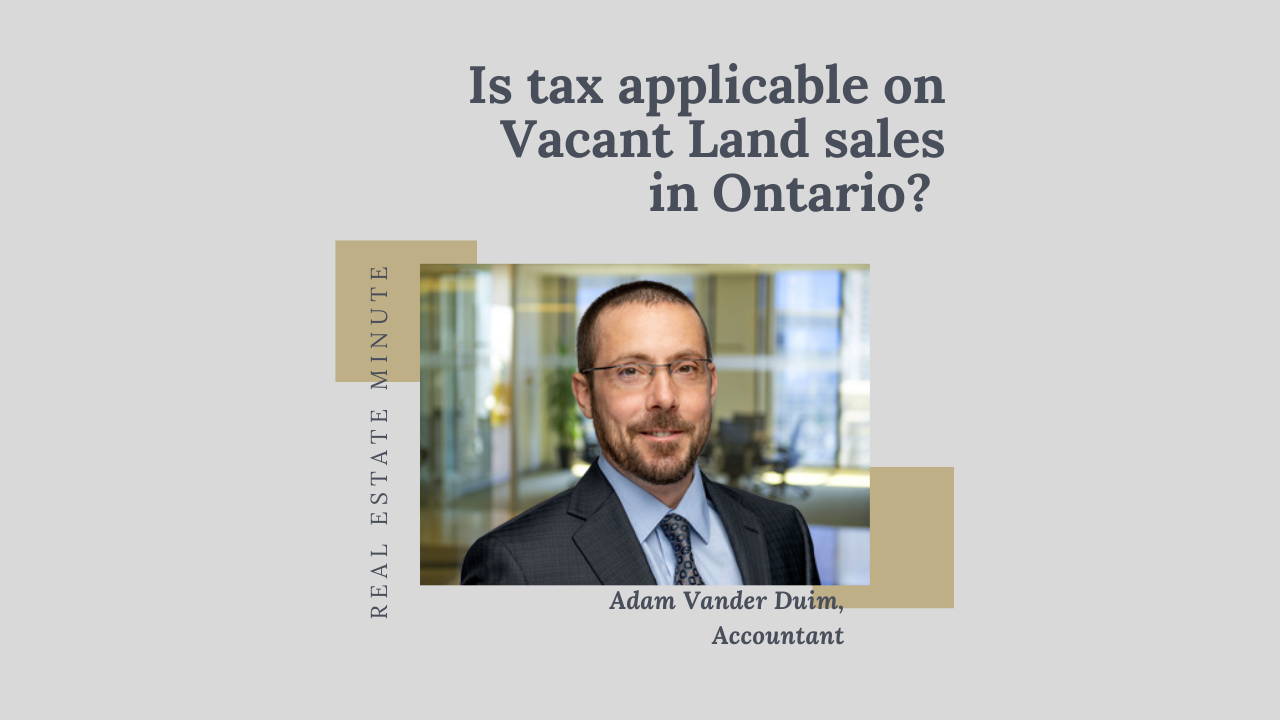
Do you need to pay HST on vacant land sales?
In this video local accountant Adam Vander Duim Gives some helpful tips. Need to connect with an accountant? you can contact Adam here.
Want to chat about Real Estate? Let’s Connect!
Are we in a housing market bubble?
Are we in a housing market bubble?
Are we in a housing market bubble? A simple google search of Canadian Real Estate will tell you that people are concerned about it. The price of a home in Grey Bruce Owen Sound has gone up 56.7% since last April, and 11.3% since January of 2021. One has to wonder, how long can this pace be sustained? It’s not just Grey Bruce that’s having this upward momentum, it’s the entire country. In the month of March, The price of a home in Canada was up 31.6% in one year according to CREA.
Why have prices gone up so much?
There has been a perfect storm of factors causing the surge in house prices; increased cost of building material and new construction, low interest rates, government grants, increased consumer savings, people moving out of the big cities and buying in smaller towns, and of course, the severe lack of supply.
But is it all going to come crashing down? Probably not. Investors dictionary defines a housing bubble as:
“..a type of economic bubble that occurs periodically in local or global real estate markets. It is characterized by rapid increases in the valuations of real property such as housing until they reach unsustainable levels relative to incomes and other economic indicators, followed by decreases that can result in many owners holding negative equity (a mortgage debt higher than the value of the property). Unlike a stock market crash following a bubble, a real-estate “crash” is a slow process, because sellers just decide not to sell.”
There is little doubt prices are inflated, should we be worried homeowners cannot afford their payments?
To get a mortgage in Canada you have to qualify based on Three things: 1) Down payment – 5% for purchases up to $500,000, 10% for purchases between $500-999,999 and 20% for purchases 1 million and over. 2) Debt service ratios – Lenders look at your monthly payments for your housing expenses, interest, car & loan payments and divide that by your annual income. That number needs equal less than 40% to get approved. 3) Stress Test – Borrowers taking a conventional mortgage must qualify based on the Bank of Canada Benchmark rate, which currently sits at 4.69%. You can still whatever the prime rate is, but you must qualify based on making payments at 4.69%. It’s not easy to get a mortgage in Canada and to think that people all of a sudden won’t be able to afford their payments if prices go down is wrong.
Will rising interest rates cause the market to crash?
What about all the talk of government intervention to cool the market? The BOC does not plan to raise the overnight rate until 2022 and any adjustments to bank interest rates should be small. Even the Federal Liberals’ Parliamentary Secretary for Housing Adam Vuaghan stated recently that Ottawa does not want to see recent gains in home prices decline.
So will we see a market crash?
Unlikely; demand remains, and underwriting criteria to qualify for a mortgage in Canada is strong. Interest rate increases will cool the market but it will be gradual. It does not appear a crash is on the horizon, even CMHC is not predicting a crash, and they always do. However a gradual cool down of the market should not come as a surprise in the coming months.
Tim Matthews is a Real Estate Agent serving Owen Sound and Grey County. Want to talk with Tim? Lets Connect
Connect with me on Social!
facebook: https://www.facebook.com/timmatthewsC21
Instagram: @timmatthewsc21
Should I hire a paralegal to help me as a landlord?
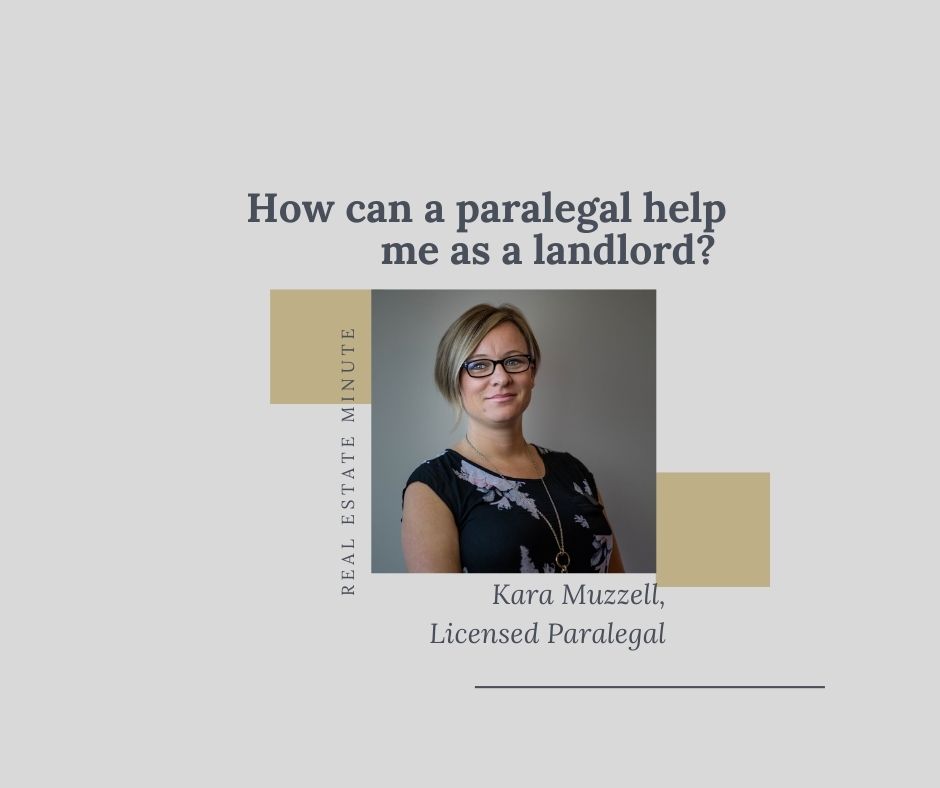
Should I hire a paralegal to help me as a landlord? Yes. Paralegals specialize in helping landlords and tenants in Ontario. If you have to file for an eviction, any simple mistake can get your case thrown out. A paralegal can save you time, money and a lot of heartache. In this video Kara, Paralegal with Muzzell Legal Services explains. If you need to contact the Landlord and Tenant Board you can find their information here. If you are looking for a paralegal to represent you, you can contact Muzzell Legal Service here.
Have questions for Tim? Lets Connect!
How should I decide what renovations to do?
How Should I decide what renovations to do?
If you are considering a renovation but are unsure what to do, watch this video as I share 3 tips that will help you decide how to prioritize your renovations and increase the value of your home.
Tim Matthews is a Real Estate Agent serving Owen Sound and Grey County. Want to talk with Tim? Lets Connect
Connect with me on Social!
facebook: https://www.facebook.com/timmatthewsC21
Instagram: @timmatthewsc21

 Facebook
Facebook
 X
X
 Pinterest
Pinterest
 Copy Link
Copy Link
